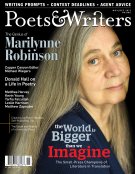As one who lives outside New York City, these moments of connection are vital for me. Having worked for several different literary journals, I had only ever known the larger community of so-called emerging translators through digital interfaces: e-mails, Trello, Twitter. And the recent addition of the conversation forums offered by the Emerging Literary Translators’ Network in America (ELTNA) has made it even easier to get and stay in contact when difficult questions come up for new translators. For translators, perhaps unlike a lot of other professions, there’s still a lot of fog surrounding the process of making an entrance into the larger field, especially if you want to make a living at it.
I hesitate to say it, but I think that many of us believe that the period of emergence ends with a first print book publication. It’s certainly a big question we all carry with us, and it often seemed on the tip of my tongue whenever I discussed my own work and the work of other young translators at the ALTA conference. Working as an intern for Open Letter this past summer, however, has partly changed my mind about that.
Publishing, need I say it, is a complicated business. Many of the independent presses dedicated to filling their catalogues with books in translation are underfunded and overextended. Even when a translated title slides into an editor’s hands, even if it corresponds with a publisher’s specific vision, it’s more a question of timing—to avoid the term luck—than talent. Because if there’s one thing that became apparent at the conference last winter, it’s that a lack of talented translators is not the problem.
One of the things that I love about the translation community as I’ve come to know it is how we actively read one another’s writing. Certain presses, I believe, become allies as well. If I spot an Open Letter or Two Lines Press title on a shelf, I can’t really help but go look, read a passage, negotiate how many meals I might have to give up for it (two, usually, depending on my budget). But I don’t mind paying that money, because sitting in front of a computer for hours while thinking about another translator’s writing—as well as being counseled by patient editors like Kaija—has made me acutely aware of the work behind editorial negotiation, especially at presses like Open Letter that actively collaborate with early-career translators.
My first full-length translation, Peri Rossi’s novella Strange Flying Objects, is forthcoming later this year from Ox and Pigeon, a relatively new press dedicated to literature in translation. But the most notable aspect of their mission? They’re still completely digital. It’s a surprising fact, as some readers might already know, because the few translation-based publishing houses that first pursued the e-book route quickly discovered that many of their readers still want things: artifacts, collectibles, proof of an author’s life beyond death. And as a translator I feel that pull too. I want to see a book materialized before me in the form through which I’ve been taught to revere it. But I think that if we’re really going to make space for emerging translators in such a tight market, we can’t simply ignore the e-book: We need to explore its possibilities and make it our own. I anticipate that some form of this topic will move out of private conversations and take center stage at the next conference, as more and more translators register with ALTA to stake a claim in the community to which they belong.
Almost a year after being named a 2014 fellow, and as I prepare for my trip to the upcoming conference in Tucson, Arizona, I think I’m coming around to something: Perhaps the figure of the emerging translator doesn’t really exist. I’m not saying this to be dismissive. Translation is a skill, one to be honed, and we should celebrate the recent initiatives that make room for translators in the early stages of their craft. I would not be writing this article, for example, had I not been chosen by ALTA to represent a new cohort last year, had I not been funded by my PhD program to pursue my translations, had I not been welcomed by Open Letter to engage in the thornier issues of the editorial process. But I want to question what it means to have “made it,” to be “present” on the scene, to be emerging, and to have emerged.
Instead, I find that being a translator is always a process of recognizing, forgetting, and retracing the routes we make through texts. Sometimes I look back at stories I’ve translated (few though they are) and can hardly remember working through certain lines. And I know that, whatever translation I might publish in the future, another reading will reveal infelicities—things that once made sense but that now suddenly fall flat—but also those tender spots, moments in which I recognize not only the author, but also myself and the many other translator-writers who have made their way into my consciousness.
And I know I’m not saying anything new. To quote Peter Cole in the Spring 2015 issue of the Paris Review, “Smart people say such dumb and disappointing things about translation.” But if we’re saying dumb things—if we’re articulating our fear of failure, of the status of the profession, of the worlds we’re trying to inhabit—it’s only because translation is such an impossibly personal act, despite the texts never really being our own. So we say dumb things, but in the right company—whether in the rooms of the ALTA conference or in forums online—those remarks tend to make the right sense.
Megan Berkobien is pursuing a PhD in comparative literature at the University of Michigan in Ann Arbor. Her translations from the Catalan and Spanish have been featured in Words Without Borders, Palabras Errantes, and Asymptote, among other publications.








